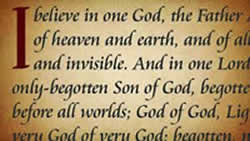
The phone rings; it's my mechanic. Not good. "The Mercury needs a full brake job," he says, much like giving an apology. I groan, then ask a few questions. He describes stuff of which I understand maybe ten percent. He gives a job estimate. I wince. "No, Jim, I don't need a second opinion," I say. "Go ahead and do it. Can we can have it by Tuesday?"
You see, I trust Jim. Rose and I have a history with him, and as a result, trust that he understands us and will recommend and do what is best for us and our vehicles. This is truly a blessing. If you've ever used mechanics you didn't trust (I have!), you know that the word "blessing" isn't an overstatement.
I'd even say that I "believe in" my mechanic. That doesn't necessarily mean that I believe every word he utters, that he never errs in judgment, that I never question him. But it does mean that, regarding my life with vehicles, I have confidence in Jim, that I trust him, that I will follow his lead. How good it is to have people in our lives we believe in.
The words "believe" and "belief" are at the core of almost all faith traditions. What would the Christian faith be without the statement "I Believe" or "We Believe"? We have statements of belief, confessions of belief, and our baptismal vows center on "I Believe".
Most often we hear the term "I believe" toward a set of statements, a set of "beliefs". "I believe God created the heavens and earth in six days." "I believe that Jesus' death on the cross provides the path to salvation." "I believe the Holy Spirit guides us as we read scripture." Some churches may use stated beliefs as litmus tests for "true believers". Such churches might say that those who say they believe that the bible is inerrant and to be taken literally are considered True Believers; those who cannot say "I believe" to the inerrant and literal statements are not True Believers. Faith is taken to be a set of beliefs.
While beliefs are important, to me something about believing as just belief statements seems shallow. Seems legalistic, kind of like putting God and our faith in a box nailed tight with belief statements. Shouldn't saying, "I believe" be something more dynamic, exciting, and life-changing?
Some English language scholars say that prior to the 1600's, the word believe did not relate to meaning that a certain statement is true. In earlier times, the verb believe always had a person as its direct object. It was used in a manner such as, "I believe in you."See works by Wilfrid Cantwell Smith, such as Belief and History, University of Virginia, 1997, and Faith and Belief: The Difference Between Them, Oneworld Publications 1998. In that way of using the term, saying, "I believe in God!" is quite different than saying that I believe a set of statements about God are true.
This way of thinking about "believing" seems to convey something much deeper and more dynamic than our usual thoughts about beliefs. Believing in God, believing in Jesus means something more like trusting God, having confidence in Jesus. It may be similar in nature to my saying, "I believe in my wife!" Or, "I believe in my mechanic." Two hymns I Know Whom I have Believed (by Daniel W. Whittle), and the gospel hymn I Know Who Holds Tomorrow( by Ira F. Stanphill), seem to convey this sense of not fully knowing or understanding, but "believing in" God and Jesus. (See video links below for versions of these two.)

New Testament scholar, theologian and author Marcus J. Borg adds yet another dimension of meaning to this earlier view of believe.Speaking Christian, Marcus J. Borg, HarperOne, 2011; pp. 118-120. He says that the word comes from the Old English be loef, which means "to hold dear," something like belove. Believing in a person meant not only having confidence and trust in a person, but also holding that person dear, beloving that person. So, saying "I believe in Jesus" meant not so much believing a set of statements about Jesus to be true; it meant more to trust and have confidence in Jesus ... and to belove Jesus.
Jesus doesn't say, "Here are some things you need to believe about me." He says, "Believe in me."
In none of this do I mean to suggest that "beliefs" are unimportant and don't matter. Beliefs are very important. Bad or unfounded beliefs can lead us down negative paths. A belief that God created some people to be poor so the rest of us can show God's love to them, seems not only wrong-headed and contrary to the whole of scripture, but can lead to ill-advised policies of helping the poor and to a distorted picture of our sisters and brothers. On the other hand, a healthy belief such as that we are called to be stewards of God's creation can lead to helping the earth flourish and give a sense of our proper place in the order of things.
Beliefs are critical in a life of faith. Much of our growth in faith is wrestling with what are "true" beliefs and what are false. Along the way we may grow out of childish beliefs (which served us well growing up) into more mature beliefs that mesh with our adult experiences and stem from living among other believers and learning in the faith. While our believing in God, our trusting God, our beloving God may remain constant through life, most likely our beliefs about God will change.
Although "believing in" and "beliefs" are interwoven, I think there can be value at times to think of them as somewhat separate. Three values for this mental separation of thinking come to mind.
It can help in productive dialogue among people of faith. And, heavens know that people of faith allow differences in beliefs to form immoveable barriers to even talking let alone meaningful dialogue. For example, if you and I are both Christian and trust each other in our statement of "I believe in Jesus," we can talk openly and honestly regarding the beliefs about Jesus on which we may differ. Such dialogue that starts on this common ground may not resolve all differences (or even any), but it can help us to view one another in a respectful light.
Also, I think it valuable to view the "believing in" as the overarching statement; the "beliefs" as
sort of descriptors that help define our believing in. For example, some have trouble saying a creed as part
of worship. They don't think they can honestly say "I believe" to it all. I understand. For me, there is a wide
 range of importance to my faith of the various beliefs of, say, the Nicene Creed. However separating believe in and belief helps
me say the creed with vigor and conviction.
range of importance to my faith of the various beliefs of, say, the Nicene Creed. However separating believe in and belief helps
me say the creed with vigor and conviction.
For example using a bit of the Nicene Creed, as I say it aloud, I can think of it this way: We believe in one God. And, who is this one God? This God we believe in is the Almighty, the maker of heaven and earth, of all that is seen and unseen. And, We believe in one Lord, Jesus Christ. And who is this Jesus? Jesus is the only Son of God, eternally begotten of the Father, ... And, We believe in the Holy Spirit. And, this Holy Spirit proceeds from the Father and the Son. ... And this Spirit has spoken through the prophets.
Finally, "believing in" has a transforming power that seems less present with a set of beliefs. While my belief that God used/uses the methods included in the theory of evolution in the creation of the earth might help me reconcile scripture with my scientific understandings, such a belief does little to make a significant impact on my life. My creation belief probably carries no more transforming power for me than does the belief that God created the heavens and earth in six literal days does for one holding that belief. However, a believing in God, a trusting in Jesus, a faith in the Holy Spirit can transform the alcoholic, can give new life to the weary, can reform the thief, can give hope to the hopeless, can give a sense of worthiness to those society considers of little worth.
A suggestion: take some time to think of the people in your life, past and present, of whom you might be able to say, "I believe in ..." (Consider yourself blessed if a mechanic is one of these!) Not only can that be meaningful in itself, but it might help in better understanding what is meant when you say, "I believe in God."
I trust, too, that as I believe IN God, God also believes IN me. I wrestle a lot with this life of faith. It is comforting however in this wrestling to believe that God believes and trusts in me ... even in those many times I wonder whether I believe and trust in God.
"I know whom I have believed ... " (2 Timothy 1:12)
PS: We did get the brake job. Cost less than I'd feared. And, I feel safer driving with those firm brakes. Thanks, Jim! Not sure I'd go so far to say I belove you; but, it's good to trust and believe in you.
Resources Related To this Reflection
(With Lyrics)
(Perhaps a brief ad first)





